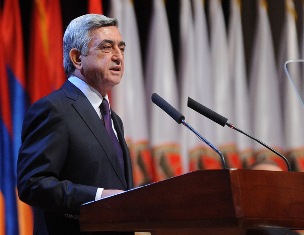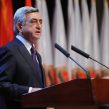
Battle Lines Drawn in Armenian Parliamentary Race
Publication: Eurasia Daily Monitor Volume: 9 Issue: 54
By:

With a flurry of conventions and behind-the-scenes discussions, Armenia’s leading political forces have officially begun preparations for upcoming parliamentary elections that will be critical for the political future of President Serzh Sargsyan. The election campaign is shaping up to be essentially a three-horse race between Sargsyan and his two predecessors, Robert Kocharian and Levon Ter-Petrosian. Despite their deep-rooted mutual antagonism, the former presidents now seem to share one strategic goal: to strip the ruling Republican Party of Armenia (HHK) of its parliamentary majority and thus deal a massive blow to Sargsyan’s plans to win reelection next year.
The HHK officially holds 63 seats in the country’s current 131-member parliament and also enjoys the strong backing of about a dozen nominally independent deputies. Senior representatives of the presidential party have made clear in recent weeks that it expects to not only retain but also solidify its grip on the National Assembly as a result of the elections slated for May 6.
The main threat to the realization to the HHK’s plans clearly emanates from the Prosperous Armenia Party (BHK) of businessman Gagik Tsarukian, a junior partner in Sargsyan’s governing coalition. Tsarukian, who has long been regarded as a Kocharian protégé, enjoys a populist appeal with mostly lower-class people stemming, in large measure, from his large-scale (and often questionable) benevolent activities. The beefy tycoon has also used his wealth to build a nationwide network of well-to-do and government-linked loyalists, which is essential for doing well in less than free and fair elections.
The BHK has 26 deputies in the outgoing parliament and is represented in Sargsyan’s cabinet by four ministers. It makes no secret of its desire to gain greater presence in government, something that could pave the way for Kocharian’s return to the political arena. The ex-president, who governed Armenia from 1998-2008, repeatedly hinted at such a possibility last year (EDM, October 28).
Sargsyan has sought to preclude a Kocharian comeback by pressuring the BHK to explicitly pledge support for his candidacy in a presidential election due in February 2013. The pressure has clearly not worked so far, with Tsarukian and his party remaining noncommittal on the 2013 ballot.
Simmering tensions between the two coalition partners boiled over on February 6 when BHK lawmakers blocked the passage of a major government bill in the parliament (www.a1plus.am). The move prompted strong criticism from the HHK’s parliamentary leaders. Tsarukian’s party responded by boycotting a parliamentary session held the next day (www.lragir.am, February 7). Sargsyan, Tsarukian as well as Artur Baghdasarian of Orinats Yerkir (Country of Law), the third party represented in the government, met on February 12 in an apparent effort to calm the tensions. An HHK spokesman said afterward that they agreed to contest the parliamentary elections in an “atmosphere of mutual tolerance” and make sure that there is only “civilized competition” among their parties (www.armenialiberty.org, February 13).
The BHK underlined the seriousness of its electoral intentions when it admitted former Foreign Minister Vartan Oskanian to its ranks later in February. A key member of the Kocharian administration, Oskanian has been highly critical of Sargsyan’s domestic and especially foreign policies since leaving office in 2008. In a February 18 interview with RFE/RL’s Armenian service, the Syrian-born former US citizen insisted that the ruling HHK will lose its parliamentary majority if the May 6 vote is democratic.
The HHK-BHK squabbles are closely watched by Ter-Petrosian, the other ex-president who leads the main opposition Armenian National Congress (HAK). Ter-Petrosian has attempted to capitalize on and even contribute to the discord with offers of cooperation repeatedly extended to Tsarukian in recent months. He has gone as far as to publicly deny the tycoon’s reputedly close ties with Kocharian in a bid to preempt objections from his loyalists. For many of them Kocharian the remains the number one hate figure because of ordering a deadly crackdown on a Ter-Petrosian-opposition movement in 2008. Speaking at a March 1 HAK rally in Yerevan attended by the author, Ter-Petrosian dismissed as a “conspiracy theory” the widely held belief that the BHK is pushing Kocharian’s agenda.
Behind the shrewd HAK leader’s Machiavellian tactics is a calculation that Sargsyan would struggle to fight on two fronts in the parliamentary race and therefore risk winning less than half of the parliament seats. A hung parliament would dent Sargsyan’s reelection chances and increase the HAK’s influence on the political process even if it clears the way for Kocharian’s return to active politics.
Yet as things stand now, Sargsyan and his party remain the election favorites thanks to their control of virtually all electoral commissions, vast government and financial resources at their disposal, and their ample experience in vote manipulation. The HAK warned late last year that it will stage sustained street protest if the authorities rig the upcoming elections. But with Armenians traditionally showing strong interest only in presidential elections, the opposition bloc’s ability to mobilize large crowds come May is in serious doubt. Attendance at regular HAK rallies in Yerevan steadily decreased in 2009-2011. Besides, it is far from clear what Tsarukian’s BHK will do if it also considers official vote results falsified.
Sargsyan should also benefit from major Western governments’ remarkably positive attitudes toward his administration. Contrary to the dominant view in the Armenian opposition and civic circles, senior US and European Union officials say the authorities in Yerevan are serious about their pledges to ensure the proper conduct of the next Armenian elections. “I am reassured by the President’s commitment that these elections will be conducted in accordance with democratic international standards,” European Commission President Jose Manuel Barroso said after March 6 talks with Sargsyan in Brussels (www.armenialiberty.org).
Wilfried Martens, president of the European People’s Party, went further, saying that the HHK’s victory in the elections is a forgone conclusion and that his coalition of Europe’s leading conservative parties looks forward to celebrating it. “Long live the Republican Party,” Martens said in a video address to the HHK’s March 10 congress in Yerevan chaired by Sargsyan (Armenian Public Television).




